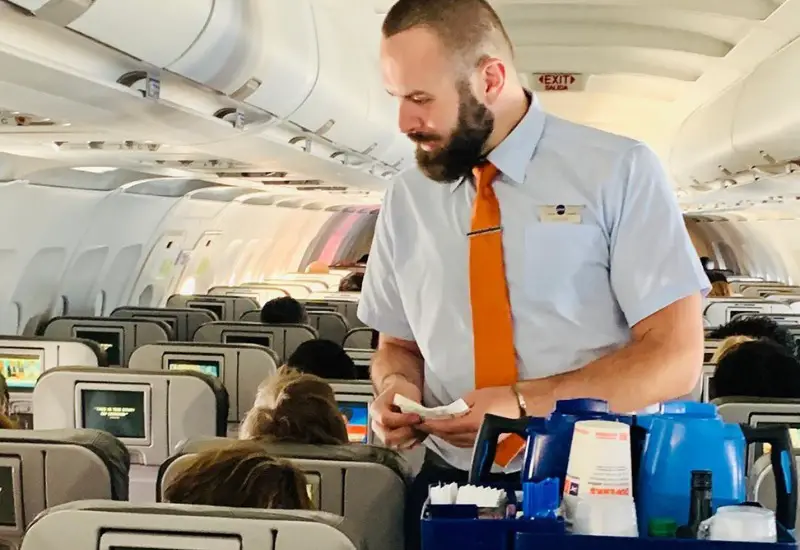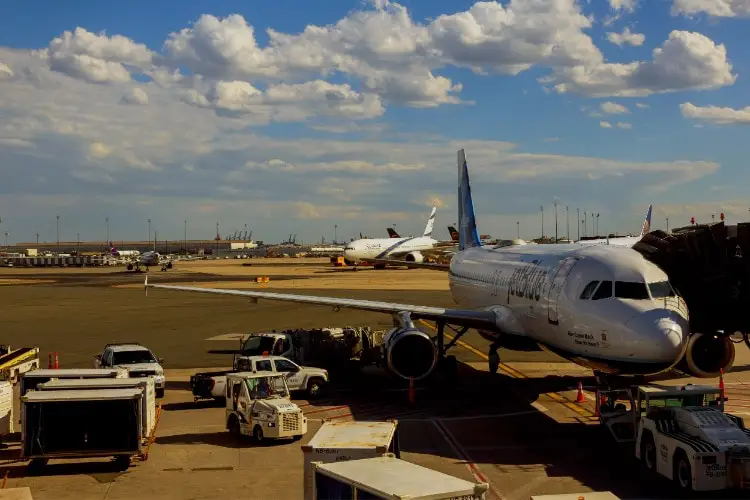
A departing flight can be exciting for everyone on board including the flight attendants (also known as Inflight Crew Members at JetBlue).
Since flight attendants are paid per flight hour, a take-off marks the beginning of our paid hours.
Aside from flight hours, there are several factors that affect the salary of a flight attendant at JetBlue.
I myself a JetBlue flight attendant will try to break down our salaries in the most comprehensible way.
Table of Contents
How Much Do JetBlue Airways Flight Attendants Make?
Flight attendants with JetBlue Airways start out making between $25,000 – $35,000 per year. This salary includes flight hours, per diem, international pay, position, holiday, red eye flights, language, recognition, and other forms of payment. More senior flight attendants can make upwards of $100,000.
It’s quite difficult to determine exactly how much a flight attendant will make because it depends on several factors including seniority, schedules, and special positions.
But this is what you should expect.
Let’s get into the detail of how is structured a flight attendant’s salary.
Factors That Affect a Flight Attendant’s Salary
Seniority
Seniority is everything when it comes to a flight attendant’s pay and schedule.
Most airlines, including JetBlue, operate based on a seniority-based system where the flight attendant who has been employed the longest and is the oldest is the most senior.
In contrast, the youngest and most newly employed flight attendant is the most junior.
When a flight attendant is hired at JetBlue they are given a seniority number in which they are then placed on the seniority list.
Seniority is important for two reasons: pay and flight schedule.
Every year during your hiring month you receive the next year’s pay raise.
Senior flight attendants cap out at 13 years with a whopping straight scale hourly rate of $57.53 and our starting premium scale hourly rate is $21.42.
As JetBlue hires more flight attendants, you become senior to the new hires.
Not only do you continue earning a higher hourly rate, but you also will be able to have a better schedule as you become more senior and JetBlue hires more flight attendants.
Every month starting on the first, you’ll bid (pick) for the schedules you want for the following month.
This is where seniority comes into play because the senior mamas will generally receive the schedules they bid for over the junior flight attendants.
Schedules
Aside from seniority, a schedule is everything at JetBlue!
Upon first glance, schedules can be very complicated and confusing.
A smart flight attendant will learn the ins and outs of scheduling quickly though in order to make the most bang for their buck.
There are several official manuals, social media platforms, and fellow co-workers who are more than willing to assist and teach the new hires to bid for their monthly schedules.
When you bid, there are three main assignments that you bid for: a line, a reduced lower limit, and a reserve schedule.
1) LINE
A line means a set schedule for the following month (you have and you know your monthly schedule of trips ahead of time).
Those flight attendants will know exactly where they fly and when they will fly.
This sounds the best right?
It absolutely is the best option in my opinion.
Your work and leisure life completely change once you become senior enough to hold a line versus being on reserve (on call, just like nurses and firefighters).
Most flight attendants will always prefer a line but that is the beauty of having so much flexibility and options in terms of building our own schedules is that everyone will bid for something different.
But again, it depends on your seniority with the airline.
2) REDUCED LOWER LIMIT (RLL)
If a flight attendant cannot hold a line due to their seniority and our bidding platform cannot assign them at least 70 hours, then they are assigned an RLL which also means a partial line.
They will be scheduled around 35 hours of assigned trips.
The unique and nice part about being scheduled for an RLL is the ability to pick up (get or add) additional trips.
So you have the option to pick up trips from the electronic trade board.
The electronic trade board is where flight attendants can go to drop trips, trade trips (swap trips with other crew), and pick trips up.
If the flight attendant does not pick up additional hours using our open time pot platform with available trips, then they will be assigned reserve days that equal at least 70 hours.
3) RESERVE
The majority of flight attendants that can hold a line or RLL due to their seniority will get a set schedule: with all their flights assigned previously, which is great to be able to plan your life in advance.
But most junior flight attendants will be assigned reserve.
Meaning that they will be on-call on certain days during a month, so they must have their phone on them and wait for crew scheduling to call.
At JetBlue, reserve means that you will be scheduled 18 days a month of ON CALL assignments. For each reserve day, you are assigned 10 hours of on call time.
A reserve finds out exactly what time they are on call the day before the reserve day starts.
During your time on reserve, you may be assigned a trip to work over the course of your reserve days or you may also be called to sit at the airport (it’s an airport standby) so that you are ready for last-minute flight assignments.
Reserves must be ready to work a quick day trip or a 4-day trip with only a 2-hour notice once called during their reserve time.
WHAT CAN YOU BID FOR?
To complete your monthly bid, a flight attendant may enter dozens of different preferences.
This is the fun part!
Every flight attendant wants a different type of schedule so it’s nice that we are able to control our schedules to some extent while keeping seniority in mind.
A JetBlue flight attendant may specify:
- an aircraft (B737, A330)
- positions (galley, lead)
- layovers (destinations where you stay instead of flying back immediately)
- trip length (e.g. 2-day trips)
- buddy bids (choose to bid a line to fly with another Flight Attendant)
- time of flights (working earlies, lates, night flights…)
- locations (Paris, Frankfurt…)
- and several other factors that a flight attendant needs to take into consideration because every little piece of their schedule may affect their pay in some capacity.
Some flight attendants enjoy long layovers because we are paid per diem at a rate of $2.15 for every hour that we layover while other flight attendants prefer a short hour so that they are flying and making their higher hourly pay.
If you enjoy flying redeyes (night flights), then you will be paid an additional night override pay.
International trips, positions, and holiday pay are all ways to earn extra money on top of your hourly rate.
These are all important aspects of a flight attendant’s schedule because they directly affect your pay.
Holiday rate is Premium: 2x base rate and Straight: 1.75 x base rate.
Special Positions
While seniority and schedules make up the most important aspects of a JetBlue flight attendant’s pay, there are some special positions that a flight attendant may work that will earn them extra pay.
Some special assignments a flight attendant may also work include:
- a language of destination (LOD)
- Mint Service Crew Member (MS: Business/First class ASSIST)
- onboard lead (OBL: Business/First class service lead)
- and several other special assignments that management may announce.
A language of destination (LOD) flight attendant is a common position for a bilingual individual who speaks Spanish fluently. An LOD must work at least two trips per month in which they are needed to speak Spanish on a flight. They are needed to make public announcements in Spanish and attend to various situations on board that require a Spanish speaker. They are paid $ 2 extra on top of their hourly rate for each flight that they are an LOD for.
If you are working a pairing and assisting Mint Service, you’ll get $4 extra on top of the hourly rate you chose.
Flight Hours

Having schedule flexibility not only means deciding on where and when you will fly but also includes how much or how little you decide to work.
On average, a flight attendant will have at least 70 hours assigned to their monthly schedule (Straight) or 75 hours (Premium)
They are able to pick up (add) additional trips that are available and work a max of 150 hours or a minimum of 60 hours as a full-time flight attendant.
Depending on seniority, this is a huge difference in hourly pay per month!
At JetBlue Airways, your starting rate is $21 per hour the first 6 months. After that, there are two pay scales to pick from: straight or premium pay.
The pay scale that you pick should coincide with how many hours you plan to work each month.
If you work a lower number of hours such as 70 flight hours, then you would want to choose straight pay.
The break-even point is 88 hours.
If you work more than 88 hours, then you would want to elect to be on the premium scale because you are paid at a higher hourly rate once you work 70 hours.
However, if you work under 88 hours per month, then you would want to be on the straight pay scale.
JetBlue flight attendants cap out at 13 years with a straight pay of $57.53
This means that the flight attendant likely works below 88 hours per month.
However, if a 13-year senior flight attendant decides to work 100 hours for example, then they would want to be on premium pay.
The premium scale pays a base rate of $52.41 up until you work 70 hours and then you earn $78.61 thereafter.
Having two pay scales can be confusing but it is meant to ensure fair salaries for those that would like to work full-time but work minimum hours while also giving an incentive to those that would like to work more hours.
Jetblue Airways Straight pay and Premium pay payscale
| Seniority | Premium scale |
Straight scale |
|---|---|---|
| 1 – 6 months | 21.42 (Up to 70 hours) 32.13 (+71 hours) | n/a |
| 7 – 12 months | 24.17 (Up to 70 hours) 36.26 (+71 hours) | 26.54 |
| 1 year | 26.38 (Up to 70 hours) 39.57 (+71 hours) | 28.96 |
| 2 years | 28.34 (Up to 70 hours) 42.50 (+71 hours) | 31.10 |
| 3 years | 30.36 (Up to 70 hours) 45.53 (+71 hours) | 33.31 |
| 4 years | 32.70 (Up to 70 hours) 49.05 (+71 hours) | 35.89 |
| 5 years | 36.07 (Up to 70 hours) 54.10 (+71 hours) | 39.60 |
| 6 years | 39.09 (Up to 70 hours) 58.63 (+71 hours) | 42.89 |
| 7 years | 40.58 (Up to 70 hours) 60.86 (+71 hours) | 44.53 |
| 8 years | 41.92 (Up to 70 hours) 62.88 (+71 hours) | 46.02 |
| 9 years | 43.64 (Up to 70 hours) 65.45 (+71 hours) | 47.89 |
| 10 years | 45.37 (Up to 70 hours) 68.05 (+71 hours) | 49.79 |
| 11 years | 47.49 (Up to 70 hours) 71.24 (+71 hours) | 52.12 |
| 12 years | 52.41 (Up to 70 hours) 78.61 (+71 hours) | 57.53 |
For a flight attendant on reserve during the first year, their salary is admittedly quite low.
$21.42 x 70 hours = $1,499 per month minus deductions.
If the reserve flight attendant has long layovers, red eye flights, or other ways to make extra money this number may increase but in general, the first year as a flight attendant may be tough financially.
Recently, JetBlue has allowed reserve flight attendants to pick up an additional 20 flight hours to be paid on top of their guaranteed 70 hours which is a nice pay incentive.
When Do JetBlue Airways Flight Attendants Get Paid?
JetBlue flight attendants are paid twice a month on the 8th and the 20th.
This is pretty odd and highly controversial amongst the flight attendants since there is generally an 18-day wait between the 20th and 8th paycheck.
The paycheck on the 8th is considered the bigger check because it includes extra pay such as premium scale pays, per diem, red eye pay, international pay, credit card incentives, and other factors.
The second pay on the 20th is always less and includes your base pay rate at 35 hours only.
Deductions
Deductions on your paycheck depend greatly on your personal preferences and situation.
In general, most JetBlue flight attendants have tax withholdings which include social security and Medicare.
In the state of New York, there is a disability tax and a family leave tax.
Other deductions are for the most part voluntary but most JetBlue flight attendants opt to have certain deductions for themselves and their families.
These deductions include healthcare, dental, 401k, health savings account, short-term disability, stock purchases, and ROTH IRA deductions.
The amount of tax withholdings and voluntary deductions certainly adds up but with seniority and a strategic schedule, you can absolutely make an excellent salary while also receiving incredible flight benefits.
As JetBlue continues to soar over time, a flight attendant will climb in seniority and earn more pay each and every year!


